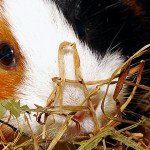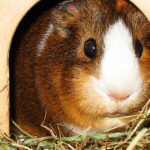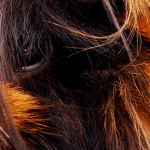The Guinea Pig health check
Your cavies are in good condition if the following checks match:
- Eyes
The eyes should be clear and clean and shows no incrustation or defluxion / discharge. - Ears
The ears are clean and dry without any incrustation or dirt. - Mouth
The mouth is dry and clean without incrustation. - Nose
The nose of rodents like Guinea Pigs should be dry without defluxion / discharge. - Claw
The claws are cutted short and are not dirty. - Fur
The fur should be shiny and closed without entanglements or bald / bare spots. - Teeth
All teeth are in good condition it they are straight, all-over abraised and not too long - Bursa perinealis
It has to be dry and clean - Anus
The anus is clean and dry - Weight
The weight of a full-grown Guinea Pig is nearly constant and should not swing more than 50g / 0.10lb.
Indication / symptoms for sickness of your Guinea Pig
If you can spot any of the following indications at your health check you have to meet the vet soon!
- swollen eye area or eye openings clotted by secretion
- watering eyes, cloudy eyes, swollen eyelids
- crusted or weeping ears
- crusted nose, nosebleed, nasal discharge
- sniffling and/or constant sneezing
- constant / frequent cough
- imbalance / impaired balance
- breathing difficulties / breathing noises
- too long, crooked or rolled teeth
- diarrhea (immediately meet a vet!)
- constipation / distended stomach
- loss of appetite
- blood in urine or stools
- any kind of crusts
- shaggy look / fur or bald spots in fur / sheds
- dents, swellings or abscesses
- itching or cramps
- signs of paralysis
- high salivation and / or wet chin
- lose weight more than 50g per week
How to find a good vetenerian for rodents / Guinea Pigs
Rodents are often second-class-animals in academic studies. You need to know this because some vets act exactly like this: Ohh, your rodent is ill? That happens. Go buy another one. This is frustrating. There are many vets who really don’t know much about small animals like Guinea Pigs or treat them like other small animals they know about.
You should figure out a good vet with skill in cavies nearby before one of your cavies is sick.
Follow these steps to find out:
- Is your vet specialized for some species?
- Does your vet has knowledge about cavies and knows their requirements like diet plans or how to keep them right?
- Is your vet in in-depth analysis of your Guinea Pig and checks eyes, ears, teeth and anus?
- Does he palpate your pig ripely?
- Does your vet explain his examination, diagnostics and prognosis?
- Does your vet involve you in the examination and diagnostics?
- Does your vet ask pointed questions about indications?
- If a anesthesia is needed, does he provide inhalation anesthesia?
- Will your vet care about your pig as long as it wakes up after an anesthesia? This is very important.
- Is your vet available in case of emergency in the evening or at weekend?
Important information about your sick Guinea Pig
You can help your veterinarian if you already have some important information about your sick cavy handy:
- The age
- The weight and changes in weight from the last days
- (All) indications of sickness
- Does your cavy ail? How do you recognized it?
- Does your cavy eat normal or not? What and how much does your cavy eat?
- What about its defecation?
- Are there any pre-existing conditions?
- Any drugs / medicine it gets already.
How to carry your Guinea Pig to a veterinarian
If you need to carry your cavy to a vet it is important and useful for your sick animal if you take care about, that:
- Only transport your cavy in a suitable case for small animals. It should be dark in there and filled with litter, hay and may be some fruits or vegetables.
- Guinea Pigs are gregarious animals. If there is no danger of infection just put another cavy in the box. Do not if your cavy seperates oneself in the cage.
- If it is cold or gusty you should cover the transport box with a blanket.
- Drive carefully.






